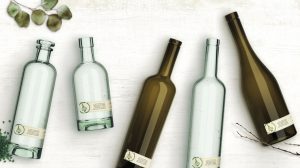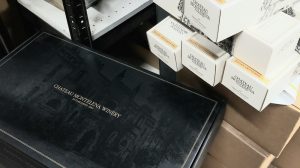
Wild Glass produced by Estal Packaging

Chateau Montelena's custom-branded cardboard packaging
Lighten Up - the Benefits of Lighter Packaging
- NAPA GREEN |
Packaging plays an important role in customer perception. We are hearing more and more stories from Napa Green members about the benefits of greener packaging AND customers giving kudos for eliminating Styrofoam and lightening packages.
The Elegance of Lighter Glass: One weighty topic that is getting a lot of attention right now is glass bottles. Somewhere along the way bigger, heavier bottles got onerously associated with higher quality, but perceptions are starting to shift.
Years ago, I was consulting with Benziger Family Winery and we started exploring lightening up bottles. The Executive Team was worried the bottles would look cheaper. We did a lineup of bottles – the originals mixed with lighter weight options. No one could tell the difference. Benziger was able to significantly reduce shipments, with huge cost and carbon footprint savings. More recently Jackson Family Wines shaved two ounces off bottle weight across 85% of their production. This reduced their overall emissions by four percent and saved them $1 million a year.
The benefits of lighter glass include reducing raw materials, energy use and greenhouse gas emissions during production; reducing transportation emissions and costs; and reducing workplace injuries from employees lifting heavy cases of wine.
These benefits are part of why Erica Harrop, Founder and President of the Napa-based company Global Package chose to launch their Elegant Light Line™ of wine bottles that provide wineries with durable and attractive alternatives to standard-weight bottles.
Consumers around the world are paying much closer attention to the cause and effect of products on the environment.
- Erica Harrop, Founder and President, Global Package
One of Global Package’s Elegant Light customers is Julie Johnson with Tres Sabores Winery.
Erica has been a true partner to us: we share green sourcing and conservation goals. When she told me that she was sourcing glass that was not only lighter, but produced using greener energy I was all in.
- Julie Johnson, Winemaker and Owner, Tres Sabores
Julie also notes the shift was seamless on the bottling line and the bottom line.
Custom, Recyclable Packaging with Quadruple Benefits: In 2017, Chateau Montelena decided it was time to move away from wood boxes for wine shipments, which were expensive to ship and didn’t provide high enough protection from breakage. They decided to shift to custom-branded cardboard with individual inserts using Coastal Products pulp.
The new packaging allowed them to fit more bottles and boxes in each shipment, with significant cost savings. For instance, it reduced the number of shipments to New York from five to two. This hugely reduced the carbon footprint of shipments to and from the winery. In addition, this lighter footprint packaging reduced breakage by nearly fifty percent. And that is not to mention that the cardboard and pulp packaging is more affordable than wooden boxes.
It was definitely the right move and we’ve received many positive compliments in being ahead of the curve on packaging.
- Matt Crafton, Winemaker, Chateau Montelena
Pushing the Envelope: Global Package is launching a new collection of Wild Glass produced by Estal Packaging, which is 100% sustainable “real cycled” and boasts a greener production process. The Wild Glass is produced from post-consumer recycled glass collected from municipalities and its production method uses lower fuel consumption.
The Wild Glass bottles are produced allowing for slight imperfections in appearance, resulting in a unique bottle that showcases their commitment to sustainability. This distinctive style of glass makes it easy for customers to identify brands that are environmental change leaders.
Making the commitment to third party certification takes time and effort, but it is worth it to demonstrate our commitment to the community and to protect our watershed, our land and the air we breathe.
- Susan Boswell, Chateau Boswell Winery
